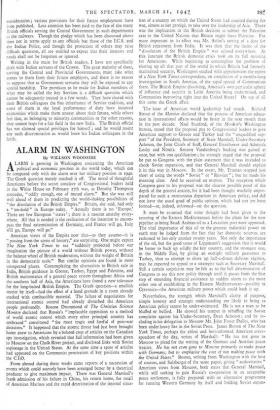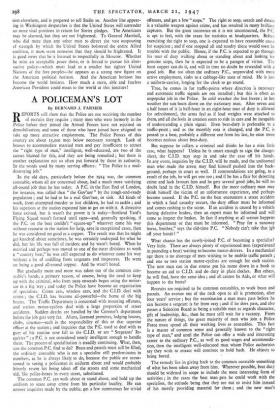ALARM. IN WASHINGTON
By. WILLSON WOODSIDE
ALARM is growing in Washington concerning the American political and economic position in the world today, which can be compared only with the alarm over her military position in 1940. The Greek question merely touched it off. The mood of thoughtful Americans before the secret conclave of Congressional leaders held in the White House on February 27th was, as Dorothy Thompson concedes, " oddly enough, one of muted alarm." But she was still well ahead of them in predicting the world-shaking possibilities of " the dissolution of the British Empire." Britain, she said, had only a " toe-hold " in Europe today. " Actually there is no 'Europe.' There are few European ' states ' ; there is a nascent anarchy every- where. All that is needed is the realisation of the intention to encom- pass the final extermination of Germany, and France will go, Italy Will go, Europe will go."
American views of the Empire now that—as they assume—it is " passing from the scene of history," are surprising. One might expect The New York Times to see " suddenly projected before our imagination the picture of a world without British power, without the balance wheel of British moderation, without the weight of Britain in the democratic scale." But similar opinions are found in most unexpected places. Contemplating the alternatives to British rule in India, British guidance in Greece, Turkey, Egypt and Palestine, and British maintenance of a general peace system throughout Africa and the southern half of Asia, the Americans have found a new tolerance for the long-baited British Empire. The Greek question—a smallish matter by itself—had the effect of a hand grenade in a room already stacked with combustible material. The failure of negotiations for international atomic control had already disturbed the American people profoundly. Roscoe Drummond of The Christian Science Monitor declared that Russia's " implacable opposition to a method of world atomic control which every other principal country has embraced " constituted " the most tragic and fateful of post-war decisions." It happened that the atomic threat had just been brought home anew to Americans by a belated crop of articles on the Canadian spy investigation, which revealed that full information had been given to Moscow on the Chalk River project, and disclosed links with Soviet espionage in the United States. At the same time a spate of articles had appeared on the Communist penetration of key positions within the C.I.O.
From abroad during these weeks came reports of a succession of events which could scarcely have been arranged better by a theatrical producer to give maximum impact. There was General Marshall's frank admission of his failure in China, his return home, the recall of American Marines and the rapid deterioration of the internal situa- tion of a country on which the United States had counted during the war, almost as her protege, to take over the leadership of Asia. There was the implication in the British decision to submit the Palestine case to the United Nations that Britain might leave Palestine. Far more important in its effect was Mr. Attlee's setting of a date for British retirement from India. It was then that the theme of the " dissolution of the British Empire " was echoed everywhere. At this juncture the British domestic crisis took on its full meaning for Americans. While beginning to contemplate the problem of shoring up all that part of the world in which Britain had formerly maintained security, Washington studied with apprehension the report of a New York Times correspondent, on completion of a months-long investigation in South America, of the rapid spread of Communism there. The British Empire dissolving, America's own particular sphere of influence and security in Latin America being undermined, and Communists burrowing right into the United States! On top of all this came the Greek affair.
The hour of American world Leadership had struck. Richard Strout of the Monitor declared that the process of American educa- tion in international affairs would be Raster in the next month than in the past decade. Neal Stanford, of the Monitor's Washington bureau, stated that the proposal put to Congressional leaders to give American support to Greece and Turkey had the " unqualified sup- port " of the President, Secretary of State Marshall, Under-Secretary Acheson, the Joint Chiefs of Staff, General Eisenhower and Admirals Leahy and Nimitz. Senator Vandenberg's backing was gained at once, but with one qualification ; he strongly urged that the proposal be put to Congress with the plain statement that it was intended to check Soviet expansion, and that General Marshall should explain it in this way in Moscow. In the event, Mr. Truman stopped just short of using the words " Soviet " or " Russian " ; but he made his meaning clear. And he received an ovation. The reception which Congress gave to his proposal was the clearest possible proof of the depth of the general anxiety, for it had been thought woefully unpre- pared for such a momentous departure in American policy, and did not have the usual goad of public opinion, which had not yet been formed—or, indeed, informed—on the question.
It must be assumed that some thought had been given to the securing of the Eastern Mediterranean before the plans for the new pipeline to bring Saudi Arabian oil to a Levantine port were approved. The vital importance of this oil to the greatest industrial power on earth may be judged from the fact that her domestic reserves are reckoned to last only another twenty years. Not only the importance of the oil, but the good sense of Lippmann's suggestion that it would be better to back up solidly the key country, and the strongest one, in the Middle East, by giving an outright military guarantee to Turkey, than to attempt to shore up half-a-dozen dubious regimes, may be expected to appeal to a strategist such as Secretary Marshall. Still a certain scepticism may be felt as to the full determination of Congress to see this new policy through until it passes from the first step of extending financial assistance in sudden alarm to the more sober one of establishing in the Eastern Mediterranean—possibly in Cyrenaica—the American military power which could back it up.
Nevertheless, the strength which Marshall's clarity of purpose, simple honesty and strategic understanding are likely to bring to American policy cannot be under-estimated. He is not a man to be bluffed or bullied. He showed his temper in rebuffing the Soviet complaint against his Under-Secretary, Dean Acheson ; and by in- cluding in his delegation to Moscow Mr. John Foster Dulles, who has been under heavy fire in the Soviet Press. James Reston of The New York Times, perhaps the ablest and best-informed American corre- spondent of the day, writes of Marshall: " He has not gone to Moscow to plead for the writing of the German and Austrian peace treaties. He has not even gone to Moscow primarily to make peace with Germany, but to emphasise the cost of not making peace with the United States." Reston, writing from Washington with the best of sources, and Sulzberger of the same paper, giving " authoritative " American views from Moscow, both stress that General Marshall, while still seeking to gain Russia's co-operation in an acceptable peace settlement, is fully prepared with an alternative programme for running Western Germany by itself and holding Soviet expan- sion elsewhere, and is prepared to tell Stalin so. Another line appear- ing in Washington despatches is that the United States will surrender no more vital positions in return for Soviet pledges. The Americans may be alarmed, but they are not frightened. To General Marshall, who did more than any other man to direct the vast outpouring of strength by which the United States bolstered the entire Allied coalition, it must seem nonsense that they should be frightened. It is good news that he is listened to respectfully in Moscow. Whether he wins an acceptable peace there, or is forced to pursue his alter- native policy—which must lead to a smaller but tighter United Nations of the free peoples—he appears as a strong new figure on the American political horizon. And the American horizon has become the world horizon. How much a stern, able and fearless American President could mean to the world at this juncture!



































 Previous page
Previous page